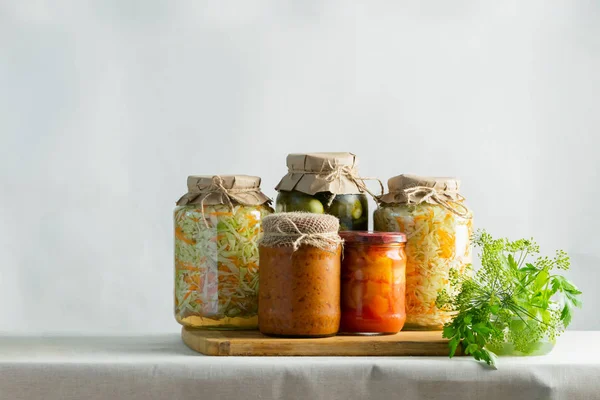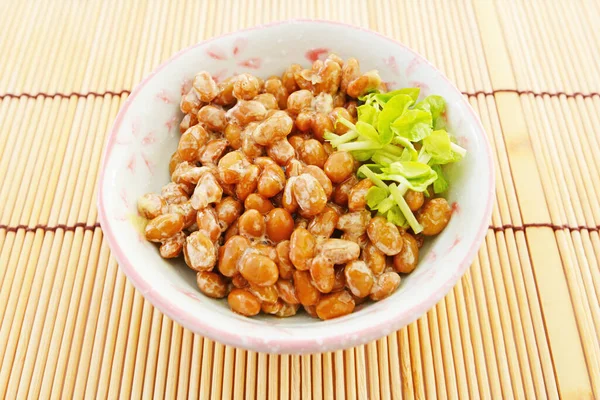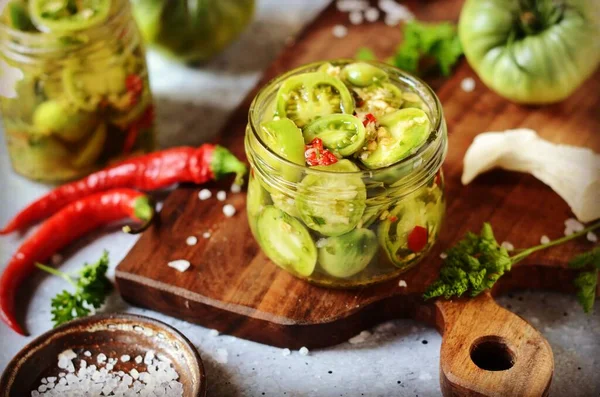
The benefits of fermented foods and how to incorporate them into your diet
Fermented foods have been a staple in many cultures for centuries, but in recent years, they've been gaining popularity in the Western world as well. And for good reason! These tiny powerhouses of flavor and nutrition pack a punch in terms of health benefits. From improving gut health to boosting immunity, fermented foods can do wonders for our bodies. But what exactly are fermented foods and how can we incorporate them into our diets?
First things first, let's define fermented foods. Essentially, fermentation is the process of using microorganisms such as yeast or bacteria to break down and preserve food. This process not only enhances the flavor and texture of the food but also increases its nutritional value. You may be familiar with fermented foods like yogurt, kimchi, and sauerkraut, but did you know that fermented foods come in all shapes and sizes? From miso to kefir to kombucha, there's a fermented food out there for everyone.
Incorporating fermented foods into your diet is not only delicious, but it's also easy. Whether you're a beginner or a fermentation pro, there are countless ways to add fermented foods to your daily meals. From adding a spoonful of sauerkraut to your sandwich to sipping on a refreshing glass of kombucha, the possibilities are endless. And if you're feeling adventurous, why not try making your own fermented foods at home? Trust us, it's not as intimidating as it may seem! So, join us on this fermented food journey and let's discover the flavorful world of fermentation together!
What are fermented foods? 

Fermented foods are foods that have been through a process of fermentation. This process is when microorganisms like bacteria, yeast, or mold break down the sugars, starches, and other carbohydrates in food. This breakdown creates lactic acid, acetic acid, and alcohol, which preserve and enhance the flavor of the food. In simpler terms, fermentation is like a magic trick where food is transformed into something even better!
Fermented foods have been around for centuries and can be found in almost every culture. Some of the most well-known fermented foods include yogurt, cheese, pickles, sauerkraut, kimchi, kefir, and kombucha. But fermented foods come in all shapes and sizes, and you may be surprised to find out that many of the foods you already love are fermented. Beer, wine, chocolate, and even coffee are all fermented foods!
Fermented foods are not only delicious but also packed with benefits. The fermentation process increases the nutritional value of the food, making it easier for our bodies to absorb and utilize the nutrients. Fermented foods are also known to improve gut health, boost immunity, and even improve mental well-being. And let's not forget the added bonus of probiotics, the good bacteria found in fermented foods, which can improve digestion and overall gut health.
So, next time you're at the grocery store, don't be afraid to venture out of your comfort zone and try a new fermented food. You may just discover your new favorite food, and your gut will thank you for it!
Health benefits of fermented foods

Fermented foods are not only delicious but also pack a punch when it comes to health benefits. From improving gut health to boosting immunity, these tiny powerhouses can do wonders for our bodies. Let's dive deeper into some of the specific health benefits of fermented foods.
One of the most well-known benefits of fermented foods is their ability to improve gut health. The fermentation process creates probiotics, also known as good bacteria, which can help balance the gut microbiome. This balance can improve digestion, reduce inflammation, and even alleviate symptoms of certain gut disorders like Irritable Bowel Syndrome (IBS) and Inflammatory Bowel Disease (IBD).
Fermented foods can also boost our immunity. The probiotics found in fermented foods can help strengthen the gut-associated lymphoid tissue (GALT), which is a part of our immune system that resides in the gut. This strengthening of GALT can lead to improved overall immunity and reduced risk of infection.
But the benefits of fermented foods don't stop there. Some studies suggest that consuming fermented foods can improve mental well-being by affecting the gut-brain axis. The gut-brain axis is the connection between the gut and the brain and consuming fermented foods can help improve communication between the two, leading to reduced stress and anxiety.
Fermented foods also have anti-inflammatory properties, which can help reduce the risk of chronic diseases such as heart disease, cancer, and diabetes. Some fermented foods also have anti-cancer properties and anti-aging properties, consuming fermented foods can help reduce the risk of certain types of cancer and delay aging.
So, next time you're enjoying a bowl of yogurt or a plate of pickles, remember that you're not just satisfying your taste buds but also nourishing your body. Fermented foods truly are a win-win!
Nutritional Benefits of fermented foods

Fermented foods not only taste great but also pack a punch when it comes to nutritional benefits. The fermentation process can increase the nutritional value of the food, making it easier for our bodies to absorb and utilize the nutrients. Let's take a closer look at some of the specific nutritional benefits of fermented foods.
Fermented foods are a great source of probiotics, also known as good bacteria. These probiotics can improve gut health and boost immunity. But probiotics aren't the only nutritional benefit of fermented foods. Fermented foods also contain enzymes that can aid in digestion, making it easier for our bodies to break down and absorb the nutrients in the food.
Fermented foods can also increase the bioavailability of certain nutrients. Bioavailability refers to the amount of a nutrient that our bodies can absorb and utilize. The fermentation process can make certain nutrients more bioavailable, such as vitamin B12 found in fermented foods.
Fermented foods are also a great source of antioxidants. Antioxidants are compounds that can protect our cells from damage caused by free radicals. Free radicals are molecules that can cause damage to our cells, leading to chronic diseases such as cancer and heart disease. Fermented foods can provide antioxidants that can help reduce the risk of these diseases.
Fermented foods are also a great source of vitamin K2, which is important for bone health and can help prevent heart disease. Fermented foods also contain other vitamins and minerals such as vitamin C and potassium.
Overall, fermented foods are not only delicious but also packed with nutritional benefits that can improve our overall health. So, next time you're enjoying a bowl of yogurt or a plate of pickles, remember that you're not just satisfying your taste buds but also nourishing your body.
Incorporating fermented foods into your diet

Incorporating fermented foods into your diet is not only delicious but also easy. Whether you're a beginner or a fermentation pro, there are countless ways to add fermented foods to your daily meals. From adding a spoonful of sauerkraut to your sandwich to sipping on a refreshing glass of kombucha, the possibilities are endless. Let's dive deeper into some ways you can incorporate fermented foods into your diet.
One of the easiest ways to incorporate fermented foods into your diet is to add them to your meals as a condiment. A spoonful of sauerkraut, kimchi, or pickles can add a burst of flavor to any sandwich, salad, or bowl of soup. You can also add a dollop of yogurt to your smoothies or oatmeal for a probiotic boost.
Fermented drinks such as kombucha and kefir are also a great way to incorporate fermented foods into your diet. Kombucha is a fermented tea that can be enjoyed as is or used as a mixer in cocktails. Kefir is a fermented milk drink that can be enjoyed on its own or used in smoothies or as a base for salad dressings.
If you're feeling adventurous, why not try making your own fermented foods at home? Fermenting at home can be a fun and rewarding experience. You can experiment with different flavors and ingredients to create fermented foods that suit your taste. From pickling vegetables to brewing kombucha, the possibilities are endless.
Incorporating fermented foods into your diet doesn't have to be complicated. The key is to start small and gradually add more fermented foods to your meals. And remember, fermentation is an art, not a science. Don't be afraid to experiment and have fun with it!
In conclusion, incorporating fermented foods into your diet is not only delicious but also easy. There are countless ways to add fermented foods to your daily meals, from adding a spoonful of sauerkraut to your sandwich to sipping on a refreshing glass of kombucha. So, go ahead and give fermented foods a try, you'll be surprised how easy and delicious it can be!
Fermented foods and weight loss

Fermented foods not only taste great but also pack a punch when it comes to weight loss. The fermentation process can aid in weight loss by boosting metabolism and reducing appetite. Let's take a closer look at how fermented foods can aid in weight loss.
Fermented foods can boost metabolism, which is the rate at which our bodies burn calories. The probiotics found in fermented foods can help improve gut health and increase the absorption of nutrients from food. This improved gut health and nutrient absorption can lead to a boost in metabolism, which can aid in weight loss.
Fermented foods can also reduce appetite. The probiotics found in fermented foods can help regulate hunger hormones such as ghrelin, which is the hormone that signals hunger. By regulating these hormones, fermented foods can reduce cravings and help control appetite, leading to weight loss.
Fermented foods are also a great source of fiber, which can help keep you feeling full longer. Fiber is important for weight loss because it can help control blood sugar levels, which can reduce cravings and aid in weight loss.
Fermented foods are also low in calories but high in nutrients, which makes them a great option for weight loss. They can be a tasty and healthy alternative to high-calorie foods.
In conclusion, fermented foods can aid in weight loss by boosting metabolism, reducing appetite, providing fiber and being low in calories but high in nutrients. Incorporating fermented foods into your diet as a part of a healthy and balanced diet can help you reach your weight loss goals. So, next time you're looking for a healthy and tasty snack option, reach for a fermented food!
Fermented foods and mental well-being

Fermented foods not only taste great but also pack a punch when it comes to mental well-being. The probiotics found in fermented foods can help improve the gut-brain axis, which is the connection between the gut and the brain. This improved communication can lead to reduced stress and anxiety. Let's take a closer look at how fermented foods can improve mental well-being.
The gut-brain axis is a complex system that connects the gut with the brain. The gut contains a large number of nerve cells, also known as the enteric nervous system, which can communicate with the brain and influence our emotions, mood and mental well-being. The probiotics found in fermented foods can help improve this communication, leading to improved mental well-being.
Fermented foods can also help reduce stress and anxiety. The probiotics found in fermented foods can help regulate the production of stress hormones such as cortisol. This regulation can lead to reduced stress and anxiety levels.
Fermented foods can also improve mood. The probiotics found in fermented foods can help regulate the production of neurotransmitters, which are chemicals that help transmit messages between nerve cells. This regulation can lead to improved mood and a positive emotional state.
Fermented foods can also improve cognitive function. The probiotics found in fermented foods can help improve blood flow to the brain
How to make fermented foods at home

Making fermented foods at home is not as intimidating as it may seem. It's a fun and rewarding experience that can save you money and provide you with delicious and healthy fermented foods. Let's dive deeper into how to make fermented foods at home.
First things first, you'll need to gather the necessary equipment and ingredients. For basic fermentation, you'll need a clean glass jar, a tight-fitting lid, and a weight to keep the food submerged in the brine. You will also need the ingredients for the fermented food, such as vegetables, fruits, and spices.
The process of making fermented foods at home is simple. The basic process involves mixing the ingredients, adding a starter culture if necessary, and then letting the mixture sit at room temperature for a period of time. The fermentation process will happen as the microorganisms in the starter culture or naturally present on the ingredients consume sugars and starches, and produce lactic acid, which will preserve the food and give it the characteristic tangy flavor.
It's important to keep the fermented foods in a clean and safe environment, away from direct sunlight and at a consistent temperature. You should also check the progress of the fermentation periodically, and once it has reached the desired level of fermentation, transfer it to the refrigerator to slow down the fermentation process.
It's also important to note that different fermented foods have different fermentation times and conditions. For example, sauerkraut only needs a week or two to ferment, while kimchi can take up to a month. Be sure to consult a recipe or guide specific to the fermented food you are trying to make, and always follow food safety guidelines.
In conclusion, making fermented foods at home is a fun and rewarding experience that can save you money and provide you with delicious and healthy fermented foods. It's simple, easy and all you need is a clean glass jar, a tight-fitting lid, and the ingredients. Just be sure to keep the fermented foods in a clean and safe environment, and always follow food safety guidelines. So, go ahead and give it a try, you'll be surprised how easy and delicious it can be!
Troubleshooting common issues when making fermented foods at home

Making fermented foods at home can be a fun and rewarding experience, but it's not always smooth sailing. There may be times when you run into issues, but don't worry, these common issues can be easily resolved. Let's take a closer look at some troubleshooting tips for making fermented foods at home.
One of the most common issues when making fermented foods at home is mold. Mold can form on the surface of the fermented food if it's not kept submerged in the brine or if the fermentation process is not happening in a clean environment. To prevent mold from forming, make sure to use a weight to keep the food submerged in the brine and to always use clean equipment and containers.
Another common issue is off-flavors. This can happen if the fermentation process is not happening in a clean environment or if the ingredients used are not fresh. To prevent off-flavors, make sure to always use clean equipment and containers and to use fresh ingredients.
Another common issue is that the fermented food isn't fermenting. This can happen if the temperature is too low, or if the ingredients used are not suitable for fermentation. To fix this, make sure to keep the fermented food in a warm place, around 68-72 F, or use a fermentation thermometer to monitor the temperature. Also, make sure to use ingredients that are suitable for fermentation.
Lastly, another common issue is that the fermented food is too sour or too salty. This can happen if the fermentation process is not monitored properly or if the ratio of salt to food is not correct. To fix this, make sure to taste the fermented food regularly and adjust the salt and fermentation time accordingly.
In conclusion, making fermented foods at home can be a fun and rewarding experience, but it's not always smooth sailing. There may be times when you run into issues, but don't worry, these common issues can be easily resolved with a little troubleshooting. Remember to keep the fermentation process clean, monitor the temperature, use fresh ingredients, and taste the fermented food regularly. With a little patience and practice, you'll be a fermentation pro in no time!
Conclusion
In conclusion, fermented foods have been a staple in many cultures for centuries and have recently gained popularity in the Western world as well. And for good reason! These tiny powerhouses of flavor and nutrition pack a punch in terms of health benefits. From improving gut health to boosting immunity, fermented foods can do wonders for our bodies.
Fermented foods come in all shapes and sizes, and there's a fermented food out there for everyone. Incorporating fermented foods into your diet is not only delicious, but it's also easy. Whether you're a beginner or a fermentation pro, there are countless ways to add fermented foods to your daily meals. From adding a spoonful of sauerkraut to your sandwich to sipping on a refreshing glass of kombucha, the possibilities are endless.
Fermented foods are not only delicious but also packed with benefits. The fermentation process increases the nutritional value of the food, making it easier for our bodies to absorb and utilize the nutrients. They can also aid in weight loss by boosting metabolism and reducing appetite.
Making fermented foods at home is also a fun and rewarding experience that can save you money and provide you with delicious and healthy fermented foods. It's simple, easy and all you need is a clean glass jar, a tight-fitting lid, and the ingredients. Remember to keep the fermentation process clean, monitor the temperature, use fresh ingredients, and taste the fermented food regularly.
In short, fermented foods are a delicious and healthy addition to any diet. They are easy to incorporate, packed with benefits, and easy to make at home. So, go ahead and give fermented foods a try, you'll be surprised how easy and delicious it can be!
The benefits of fermented foods and how to incorporate them into your diet
 Reviewed by jadan
on
January 25, 2023
Rating:
Reviewed by jadan
on
January 25, 2023
Rating:
 Reviewed by jadan
on
January 25, 2023
Rating:
Reviewed by jadan
on
January 25, 2023
Rating:




No comments: